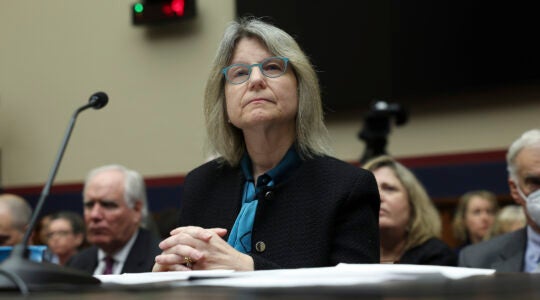NEW YORK (JTA) — Orthodox groups expressed disappointment in the decision by the New York City Board of Health to require parental consent for a controversial circumcision ritual but gave no indication that they would mount legal challenges to the new regulation.
On Thursday, the health department voted 9-0 to require mohels, or ritual circumcisers, to obtain signed consent forms from parents outlining the risks of communicable disease before engaging in “metzitzah b’peh” — a circumcision ritual in which the mohel uses direct oral-genital suction of the infant’s blood.
Following the vote, the haredi Orthodox Agudath Israel of America said it was “profoundly disappointed” with the measure.
“Tens of thousands of families in New York City” require metzitzah b’peh, the statement said. For those individuals, “the City is inserting itself directly into a religious practice. It does so by compelling mohalim to deliver a message with which they fundamentally disagree.”
The Agudah statement also said that “the regulation raises serious constitutional concerns, and will surely be subject to strict judicial scrutiny,” but it did not indicate whether attorneys for Agudah would challenge the new regulation directly.
Before the vote, the Rabbinical Council of America, a membership group for centrist Orthodox rabbis, had expressed concern about the regulation even while advocating that rabbis use pipettes to avoid direct genital contact. After the vote, Rabbi Mark Dratch, executive vice president of the RCA, told JTA that his organization would not engage in a legal challenge.
“While we would prefer the government wouldn’t involve itself in matters of religious practice, we don’t see it as anti-Semitic and we would encourage everyone to abide by these regulations,” Dratch said.
In a statement before the vote, the Conservative movement’s Rabbinical Assembly applauded the commissioner’s push for parental consent.
“This practice, which is not required by Jewish law, and emanates from older practices designed to prevent illnesses that precede current medical knowledge about disease, presents a serious health risk to babies and is inconsistent with the Jewish tradition’s preeminent concern with human life and health,” Rabbi Gerald Skolnik, president of the RA, said in a statement released Monday. “There have been tragic incidents of babies becoming ill as a result of this practice, and we encourage the Board of Health to require parental consent.”
The new regulation comes just days after a vote in Germany by the state of Berlin to impose new regulations on circumcision mandating that only doctors may perform circumcisions.
The New York City health department’s new regulation is the culmination of a year of debate surrounding the controversial practice, which was sparked by the death of an infant in Brooklyn last September and the subsequent revelation that a mohel who performed metzitzah b’peh on the infant had tested positive for herpes.
Metzitzah b’peh, the last of three steps outlined in the Talmud describing infant circumcision procedure, is still practiced in many Orthodox circles. In some cases, mohels use a tube for oral section to avoid direct oral contact with the infant’s penis. In June, New York City Health Commissioner Dr. Thomas Farley condemned the practice of direct oral suction.
The latest metzitzah controversy mirrors a similar debate that unfolded after an infant death from herpes simplex virus (HSV) in 2005. After that case, the RCA issued a statement advocating the use of glass pipettes as an acceptable alternative to direct oral suction.
In June 2006, New York State health officials and Orthodox rabbis reached an agreement on metzitzah b’peh permitting the practice provided that a mohel sanitizes his hands like a surgeon, cleans his mouths with a sterile alcohol wipe and rinses with a mouthwash that contains at least 25 percent alcohol.
JTA has documented Jewish history in real-time for over a century. Keep our journalism strong by joining us in supporting independent, award-winning reporting.





